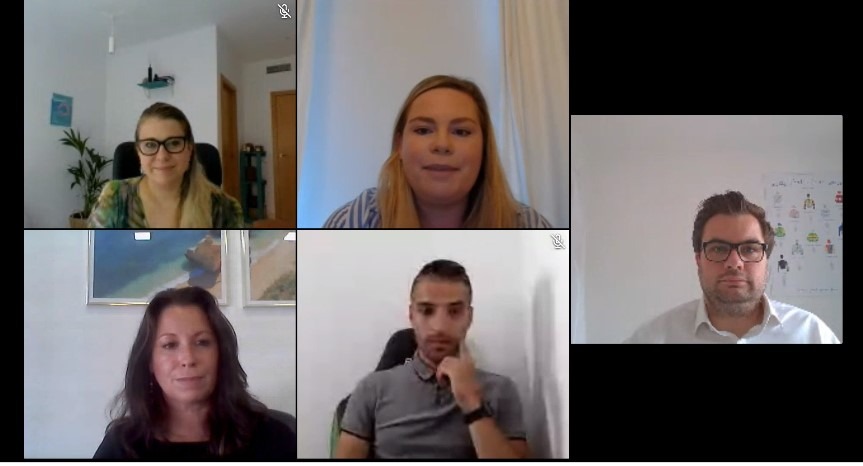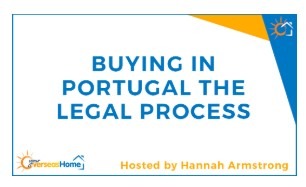Portugal Property Guides had planned to be spending our spring and summer at a series of Your Overseas Home events, meeting you in person and helping get you on your way to Portugal. Well, we know how that worked out!
However, Portugal has for the most part coped extremely well with coronavirus, and we expect a busy summer as the flights restart. So we spoke to experts in the field of Portuguese property online instead, in a series of webinars.
You can watch the Portuguese legal webinar here.
Below, we have transcribed the questions asked of our experts at the Buying in Portugal webinar. To access the full webinar just click here.

Buying in Portugal, the webinar
Fiona Thornton – Luximos Christie’s
Is Portugal dependent on British tourists and buyers? Are property prices being affected by the COVID situation in the UK?
It was the perfect storm for the British buyer. Just as the Brexit decision was made, COVID kicked in. But the economy and the real estate market are two different things and should be looked at separately.
There’s been no lessening of demand in real estate. Sales dropped 53% whilst the country was on lockdown – however it’s great that we could still operate at half the rate. In the last month, sales have increased 23% due to resumption of flights.
To be put in touch with Fiona, or any of our experts today, simply call us on 020 7898 0549 or email [email protected].
Brexit doesn’t feel as important across Europe as it does in the UK – there are no restrictions on anyone buying property here. Many other countries across Europe account for sales in the Algarve and there’s also demand from the US and Canada.
83% of properties are the same price or higher than they were before COVID. Villa rentals have become more popular as people are more reluctant to stay in hotels.
Are prices still strong in the cities?
They’re still strong. Lisbon has had a couple of issues this year though. The government changed some of the regulations on short term rentals, as they felt like locals were being priced out. Eventually, the golden visa will no longer be applicable to Lisbon, Porto or coastal areas, in order to drive investment inland. However, they’ve dialled back on that for now because of COVID.
We’ve had 1,100 visa applications just from Hong Kong citizens. Lisbon has been cited as one of four global cities that will not go down in price this year.
You talked about the ‘5-step process for buying’ (from making the decision that Portugal is the place for them, right through to getting the keys in their hands) – what is the timescale for this?
We can do it in a couple of weeks! One of my clients arrived here on the 10th of March with two months accommodation booked for their property search. A week in, when the government said that everything will be closing, the owner of the property that they rented returned their money. We’d actually found the right property for them – so at a time when everything was closing, we managed to pull in a few favours and get them into their new house within 10 days. So, under pressure, we can do it very fast!
For the average sale, from the point where they take the property off the market, it would be around three months. That gives enough time for the lawyer to do the searches, checks and make sure everything is as it should be. It also allows for the mortgage application to be made, and usually I would coordinate everybody involved to make sure we can reach the deadline date.
When should you start employing surveyors and other professionals.
Surveys here are still quite rare. Around 60% of our clients don’t actually get a survey done. Whether they decide to do so or not depends on a number of things, for example, the age of the property, the client’s personal preference etc. I do have a local surveyor here who will do a free consultation and the client can decide for themselves whether they want someone to carry out a survey.
The last three months have given us time to make contact with lawyers, currency specialists and mortgage brokers. There’s no cost involved with this and its worth getting advice from the experts to have everything planned at least a month in advance of the viewing trip.
Then, once you’re in Portugal, I can make sure that we fit in face-to-face appointments with these experts. Ultimately, you have to feel really comfortable. Once you make a purchase, we’re all still here for anything else you might need involving your property.
Are there any property search or buyers’ fees to this process? Or is it like the UK process where the seller would pay the agencies?
As far as Christies is concerned, the seller pays.
I work with the buyer but rarely have contact with the sellers. We have a team of people who work with the sellers, and they will usually give me an idea, before I show a property, of any personal circumstances that the seller might have and whether they will accept an offer. That means that I can work solely for the buyer so I’m not trying to keep two sets of people happy. My job is to ensure that the buyer is happy and to make sure that the property is right for the buyer.
I can also advise you on whether the property has potential for future extensions, adding a swimming pool etc.
Paul Harris, Smart Currency Exchange
Do you have any indication about when would be best to buy euro and if/when the pound may regain some strength over the coming months?
That’s a very difficult question to answer. Hopefully, we’re coming out of the coronavirus crisis and we might see the pound strengthening or getting back to normal. But we still have the Brexit deadline at the end of this year.
The currency traders at Smart have written a handy guide that’s free for Portugal Property Guide readers to download. Read the Property Buyer’s Guide to Currency.
It could be that once we overcome the majority of the coronavirus challenges, Brexit will still be there as a driver of volatility and could affect sterling.
The best advice would be to speak to one of our traders – they’re watching the markets all of the time and could give you a well-rounded answer.
How do your exchange rates compare to the rates that the banks give customers?
Our exchange rates will always be better than the bank.
We don’t just offer a well-rounded service where you will actually be talking to someone, you’ll be saving money on exchange rates as well. Forward contracts, which are designed to protect your money, are also not something that you will get from the bank.
Can you buy euros from two existing currencies, e.g. Yen and Sterling?
Yes! That’s no problem. Talk to our traders and they will offer you prices on both.
Could the customer buy half the euros they need now and half later on in the year?
Yes, they can and it’s another way to manage the risk. If you only buy half now, you are protecting the other half of the budget.
What is the cost of the service for getting a forward contract?
We don’t actually charge a fee on the transfers that we make. We will always let you know what the exchange rate is at the time, which is always slightly different to the ‘interbank’ rate that you would see online. We make our money on the difference between the two, so we do not charge any fee.
For continuing costs, like a mortgage and maintenance costs, is it more cost effective to buy euros month-to-month, or would it be better to do this in bigger chunks, such as quarterly.
That depends on personal preference. One thing we can do is set up a direct debit and regular payment plan. This would set the payment every month and fix the exchange rate for these payments for up to a year.
You’re then protected for the year and it’s not something you need to worry about. Alternatively, if you wanted to check the exchange rates and see if the rates are going to improve, you can do it monthly. You can use our online platform for that – simply log in and see what the prices look like.
Jacqueline Mullen and Jeremy Klingers – Mortgage Direct
As a person in my 70s, can I take out a small mortgage on a property for a short period of time?
Most banks go to the age of 75, especially if you’re not a resident in Portugal. We’d have to look at your individual case, figure out how much you want to borrow and do the affordability calculation to see if that fits. Most banks’ upper limit is the age of 75 but there are some that will go up to 80 years, so it’s possible but a very individual situation.
If getting the right mortgage is all that’s holding you back from your dream home in Portugal, get in touch today with Mortgages Direct.
Could you get a mortgage based on savings and net-worth rather than income?
Unfortunately, this is not possible. All banks require that you have a minimum income that certifies the affordability calculation. Savings help with your calculation, but this is not enough on its own to be qualified. It’s also important that the buyer has a fixed contract of employment.
How long does it take to get a mortgage approved?
It depends on the bank and how fast the client can get their papers to us. On average, it’s around two and a half months. It’s possible to be faster, however, as we completed this with one client in two weeks.
How do people get an NIF number?
It’s mandatory to get your NIF (Portuguese tax number) to buy in Portugal. The best option is to speak to a solicitor, and we can introduce you to a solicitor or lawyer. If you feel confident enough to do it yourself, however, then just speak to the Portuguese authorities directly.
Next, you can watch the Portuguese legal webinar here.












